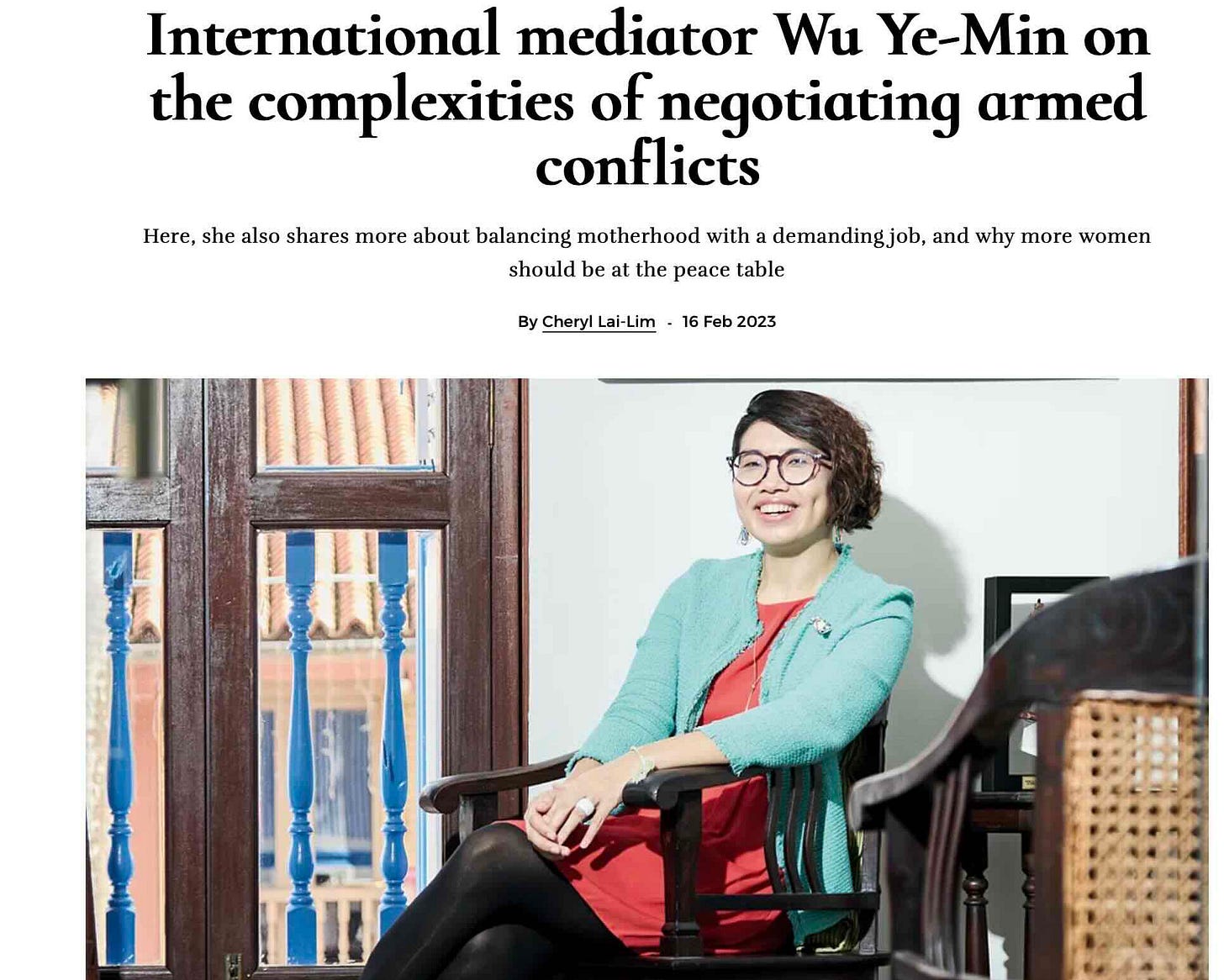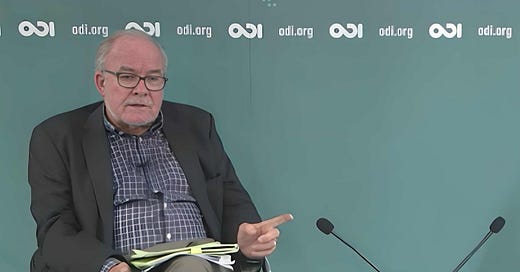The Superheroes of Humanitarian Dialogue
Elevated levels of gall and naivety at the Centre for Humanitarian Dialogue
Today DVB (English) published the second part of my three part series on the Centre for Humanitarian Dialogue. Head over there to read it.
As mentioned in these articles, locating third-party sources featuring HD is quite challenging. However, occasionally, I stumble upon a few, and they are absolute gems. For example, consider this ODI video filmed a whole month after the clearance operations that began on 25 August 2017:
This is Dennis McNamara, the "senior humanitarian adviser" of Humanitarian Dialogue (HD), speaking, I repeat, a whole month after the “clearance operations” began on 25 August, 2017, expressing uncertainty about the responsibility for the scorched earth tactics in Rakhine. Please watch it. It is only 40 seconds long. It is part of an ODI briefing.
Does this not raise serious questions about HD's understanding and interpretation of the situation on the ground? Does McNamara’s perspective not echo the narrative of the Myanmar govt and military who suggested that the Rohingya might have been responsible for burning their own homes? Does this show a concerning alignment with the Myanmar govt’s viewpoint or is this what “impartiality” is in the world of HD’s conflict mediation?
How can impartiality lead to the downplaying of atrocities? How is it possible that it comes at the cost of overlooking clear atrocities and human rights violations? Perhaps, in the intricate realm of conflict resolution, distinguishing between fact and propaganda is deemed unnecessary? Could it be that when an organisation strives to maintain relations with all involved parties, it is required to spout absolute nonsense like in this ODI example? Or perhaps not. Could it be something less innocent and more systemic? Might this suggest an inherent organisational bias within HD?
Just in case you didn’t watch the 40-second video here is McNamara’s take verbatim.
The last point on this - so just to put it in context - the last concern is that this scorched earth policy - by whomever and don't ask me to get into that bit - but the fear is it might spread to central Rakhine, which has been a separate Rohingya entity to some extent from northern Rakhine. That hasn't happened yet, but I think the speculation is if there are further ARSA attacks, which many experts expect to happen - why wouldn’t there be? - then it may well be that this response, this very harsh, brutal response will spread further.
McNamara’s claim about ARSA continuing attacks, which history has proven incorrect, reflects a misjudgment of the group's capabilities or intentions. This was not because HD did not have direct insights from the ground. Indeed, HD had extensive connections with ARSA. So we can’t really put it down to a lack of understanding of ARSA's structure, goals, and strategies.
So I wonder what it could be, Mr McNamara? What do you know that the rest of the planet does not?

The other gem I came across was this article above in Her World Singapore. In it, the Regional Director of HD, Wu Ye-Min, gives her take on things. Some of it very cringeworthy.
Wu Ye-Min's statement about not needing to be a superhero to effect change, and that everyone can play a role as a peacemaker, comes across as an attempt to romanticise or dramatise HD’s work in conflict resolution. The very use of the word "superhero" as a metaphor can only be seen as a way to elevate the perceived importance or impact of their work.
But it gets better. She says:
“If you’re meeting someone new, you treat the person as a human being beyond the flag or organisation they represent. Exuding warmth helps them to understand that you are also a human being, and that’s where the connection begins for diplomacy to happen.”
I mean - where to begin? Emphasising warmth and personal connection in diplomacy is all well and good, but when it leads to a meeting format that gives voice to perpetrators of genocide while silencing their victims, it crosses from diplomacy into the realm of dangerous oversimplification.
Her emphasis on warmth in negotiations seems painfully inadequate, if not outright tone-deaf, in the context of such a grave humanitarian crisis. By excluding the Rohingya, the very group at the heart of the crisis, the Singapore meeting made sure it would be perceived not as a step towards resolution but as a legitimisation of the junta's narrative and actions. But of course no Rohingya group would contemplate attending such a gathering despite HD’s long standing connections with one or two of them.
Wu Ye Min's approach, as reflected in the Singapore meeting's setup, reveals a naive understanding of conflict resolution, one that appears to confuse cordiality with effective diplomacy and overlooks the crucial element of justice and representation in negotiations. Rohingya will see such such naivety not just a weakness – but as a liability - to steer well clear of. And so should organisations like UNDP and UNHCR. Aligning with such an approach risks undermining their credibility further ( if that is possible) and the effectiveness of their missions.
I did reach out to Wu Ye-Min and HD in general. I never received a reply.



The ODI claim to be a global think-tank, but they are constantly overreaching themselves. They cannot possibly hope to cover everything. Dennis McNamara is clearly no expert on Myanmar, let alone on the Rohingya which is apparent from his need to refer to other experts about ARSA's plans. Interestingly, he exhibits the same denialism as did Daw Aung San Suu Kyi in her State address on 19 September 2017, and I wonder whether the ODI briefing was held before or after Daw Suu's address. It might be that Dennis McNamara's views were based on or influenced by Daw Suu. There is no malicious intent, but just woeful ignorance, even a measure of bewilderment (in both what he and Daw Suu said) based on poor judgement, unreliable sources of information, a measure of prejudice (against which we all need to guard), flawed analysis and just plain ignorance. Daw Suu though has been right all along to say how complicated the situation is in Rakhine and her understanding of Arakan affairs has slowly matured over the years. I am reminded that my former Ambassador in Cambodia, Peter Murray, an old Burma hand, has written that even during the Second World War Britain's allies against the Japanese among the Arakan Muslim population sought to free Sittwe (Akyab) through a determined jihad and drive to autonomy which he (Peter Murray) and many of his fellow British officers battling away in Northern Arakan generally supported, though it was not British Government policy at the time.